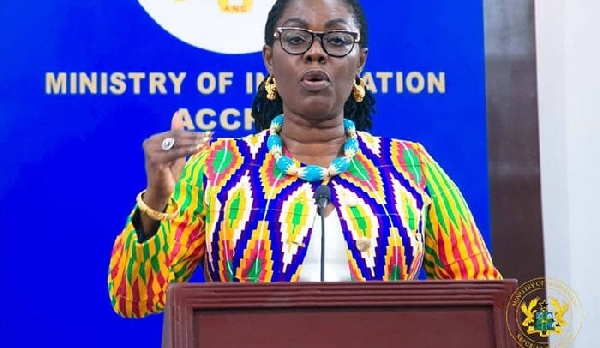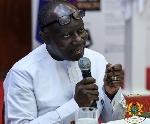You're not poor if you can MoMo GHS100+ a day – Ursula; says gov't to bag GHS500m/month from E-Levy
 Minister of Communications and Digitalisation, Mrs Ursula Owusu-Ekuful
Minister of Communications and Digitalisation, Mrs Ursula Owusu-Ekuful
Any Ghanaian who is able to send more than GHS100 day via mobile money platforms is not poor, the Minister of Communications and Digitalisation, Mrs Ursula Owusu-Ekuful, has said.
Once the 2022 budget is approved, all electronic transactions in Ghana will attract an Electronic Transaction Levy or E-Levy, as part of moves by the government to shore up its revenue mobilisation.
Finance Minister, Mr Ken Ofori-Atta, who made the announcement when he presented the 2022 budget to parliament on Wednesday, 17 November 2021, explained that the upsurge in the use of e-payment platforms as a result of the COVID-19 pandemic, has been an impetus for the introduction of the levy.
As a result, Ghana recorded a total amount of GHS500 billion from e-transactions in 2020 compared with GHS78 billion in 2016.
He said: “It is becoming clear there exists an enormous potential to increase tax revenues by bringing into the tax bracket, transactions that could be best defined as being undertaken in the informal economy.”
He noted, therefore, that the government is charging an applicable rate of 1.75% on all electronic transactions covering mobile money payments, bank transfers, merchant payments and inward remittances, which shall be borne by the sender except inward remittances, which will be borne by the recipient.
“Mr Speaker, to safeguard efforts being made to enhance financial inclusion and protect the vulnerable, all transactions that add up to GHS100 or less per day, which is approximately GHS3,000 per month, will be exempt from this levy,” he stated.
He said E-Levy proceeds will be used to support entrepreneurship, youth employment, cyber security, and digital and road infrastructure, among others.
“Mr Speaker, this new policy also comes into effect once appropriation is passed from 1st January 2022. The government will work with all industry partners to ensure that their systems and payment platforms are configured to implement the policy,” he said.
Defending the E-levy, Mrs Owusu-Ekuful said: “The state is saying that if you are sending up to a GHS100 a day, cumulatively you can send up to GH3,000 a month. That is all going to be tax-free”, she noted.
She added, however, that “if you have more than a GHS100 to send a day, then you’re not poor”.
“So, if you really are poor and you are in a position to send a GHS100 a day, then we need to re-classify our definition of who really the beneficiaries of these are”, she explained, noting: “And, it is only the sender who pays, not the recipient unlike the telcos where both the sender and receiver pay”.
The Ablekuma West MP, who spoke on Accra-based GHOne TV on Thursday, 18 November 2021, said the government could raise GHS500 million from the E-Levy per month.
“So, if you are looking at bulk payments, cash-outs, person-to-person transfers, wallet-to-bank transfers; as of October, we are looking at about GHS11 million. if you are looking at the merchants, debit payments, sending, transfers, transfers to vouchers and the cash-outs; we are looking at GHS440 million”.
“If you are looking at GhIPSS and merchant payments and direct debit payments and organisations paying to customers and paying bills and sending money, we are looking at GHS45 million. So, in total, it is possible for the government to get about GHS500 million from this in a month.”
Source: classfmonline.com
Trending News

Weija Water Treatment Plant to shut down for scheduled maintenance today Dec. 19
07:07
60 lives lost at Madina Zongo junction as pedestrians ignore footbridge-MCE
07:10
Bawku report submitted; Mahama to respond within 24 hours
20:25
NDC confident ahead of December 30 Kpandai rerun
07:27
Part (3) of many: Why US not likely to extradite Ken Ofori-Atta despite A-G's request
07:56
Accra–Kumasi Expressway to offer alternative route, not replace existing highway – Roads Minister
06:55
Mind your words on Bawku — Otumfuo advises Cletus Avoka
19:11
Ghana launches blue economy strategy to boost national development
07:25
Kennedy Agyapong vs Atta Akyea: Alex Tetteh invoke curses on former MP over alleged meeting with Ken
04:07
Trade Minister engages tomato growers and traders to resolve value chain challenges
01:51




